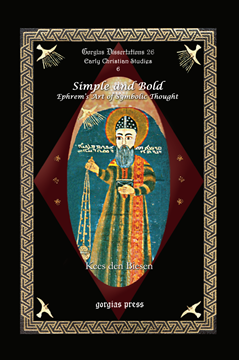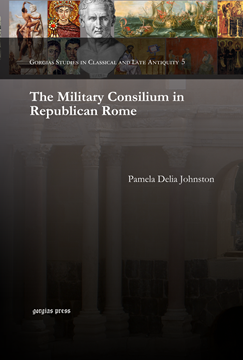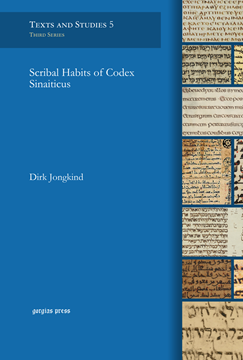Ephrem’s Art of Symbolic Thought
ISBN: 1-59333-397-8
Ephrem the Syrian is known as one of the greatest Christian poets and as a unique author whose mode of thought is usually described as “symbolic.” In this work, Kees den Biesen explores the literary, intellectual, and theological mechanisms at work in Ephrem’s writings with the specific aim of identifying the exact nature of his “symbolic thought” and evaluating its contemporary relevance. Den Biesen elaborates a comprehensive approach that integrates a variety of methods into a genuinely theological methodology. He then proposes his own comprehensive understanding of the nature and merits of Ephrem’s symbolic thought.
$197.00 (USD)
A Critical Examination of the Peshitta Version of the Book of Ezra
ISBN: 1-59333-399-4
This work fills a lacuna in the literature devoted to Peshitta studies and Old Testament textual criticism. The author examines the works of nineteenth- and early twentieth-century scholarship in the field, including the works of Nöldeke, Duval, Wright and others, and proposes corrections to the Syriac text of the Book of Ezra available then. The author then proceeds systematically through the Book of Ezra, giving the critical analysis of the text verse by verse.
$103.00 (USD)
The Military Consilium in Republican Rome
ISBN: 978-1-59333-373-7
The consilium, or advisory council, played an important role in the everyday activities of the Roman magistrate in his role as military commander. This work is an in-depth look at the commander's consilium from its first depicted appearances in the accounts of the legendary period to 31 BC. The concilium adapted to meet changing needs and serves to illustrate how Romans felt about their own society. The role of the commander's consilium can be seen as a pragmatic compromise between the desire for competent leadership and personal ambition on the one hand, and the Romans' ever-present fear of tyrannical behavior on the other.
$126.00 (USD)
Scribal Habits of Codex Sinaiticus
Series: Texts and Studies (Third Series) 5
ISBN: 978-1-59333-422-2
Codex Sinaiticus is one of the oldest, famous, and most important manuscripts of the Bible. At least three scribes copied the text manually, and they were faced with many decisions: What do I do when I spot an error in the text I just copied? What is the right spelling of this word? Is it time for a new paragraph? This book studies a variety of textual and non-textual phenomena in Codex Sinaiticus. We discover more about this important biblical manuscript as well as the individuals with their own habits, qualities, and skill levels who produced it.
$167.00 (USD)
A Dialogue on Free Will versus Fate, A Key-Word-in-Context Concordance
ISBN: 978-1-59333-374-4
This key-word-in-context concordance will facilitate the study of the very early Syriac text called The Book of the Laws of the Countries, a dialogue on free will versus fate between the Edessean philosopher Bardaisan and his interlocutor Awida.
$146.00 (USD)
Neo-Aramaic Dialect Studies
Proceedings of a Workshop on Neo-Aramaic held in Cambridge 2005
Series: Gorgias Neo-Aramaic Studies 1
ISBN: 978-1-59333-423-9
This volume contains a collection of papers presented at the workshop on various aspects of the grammar of Neo-Aramaic, with special attention to the North Eastern Neo-Aramaic dialect group. The papers include descriptions of several hitherto undescribed dialects together with sample texts and also studies of various aspects of phonology, morphology and syntax of the dialects.
$136.00 (USD)
Lishan Didan, Targum Didan
Translation Language in a Neo-Aramaic Targum Tradition
By Margo Rees
Series: Gorgias Neo-Aramaic Studies 3
ISBN: 978-1-59333-426-0
This study examines the language and translation technique used in a modern “targum” of the Bible. The targum – referred to as “Manuscript Barzani” – is a written preservation of a tradition of Jewish Neo-Aramaic Bible translation, originally transmitted in oral form among the religious leaders of a community in Iraqi Kurdistan. It represents a literary form of the Neo-Aramaic spoken by the Jews of the Rewanduz/Arbel region. Within their community, the targum was used in the schools to teach the language and text of the Hebrew Bible to the young men.
$164.00 (USD)
The Jewish Neo-Aramaic Dialect of Urmi
Series: Gorgias Neo-Aramaic Studies 2
ISBN: 978-1-59333-425-3
This volume presents a description of the Neo-Aramaic dialect that was spoken by the Jews of Urmi in north-western Iran but which is now virtually extinct. The material for the volume was gathered firsthand in fieldwork conducted with the last remaining speakers in Israel. The volume consists of a detailed grammatical description, a corpus of transcribed texts, including folktales, historical accounts and portrayals of customs, and an extensive glossary.
$241.00 (USD)
Exegesis in the Targum of Psalms
The Old, the New, and the Rewritten
Series: Gorgias Biblical Studies 28
ISBN: 978-1-59333-432-1
This volume illustrates how Targum Psalms creatively interprets selected psalms and how those interpretations relate to other Jewish and Christian traditions, including early translations of the psalms, rabbinic Midrashim, the New Testament and early Church Fathers. The study of these Psalms suggests viewing Targum Psalms as a creative partner in the world of biblical interpretation, as opposed to a compilation of already existing midrashic material. Edwards portrays the Targum as a link between the written and oral Torah that leads its readers on a path to tradition.
$157.00 (USD)
The Making and Unmaking of a Jesuit
ISBN: 978-1-59333-450-5
The Jesuits—that group of clerics so deeply imbedded in the dreams and nightmares of the Catholic Church and in the history of the world. Sometimes saints and sometimes energetic and devious schemers, the Jesuits have educated and trained most of the Catholic intellectuals of America and Europe for the last four hundred years. F. E. Peters throws open the doors of the Jesuit citadel in this story of a young man’s coming of age. This is a personal story told without romance and without rancor, and if the Jesuit life is one of bondage to an almost impossible ideal of perfect obedience and self-denial, it is also, as Ours makes clear without the slightest trace of jesuitical equivocation, a life of intelligence, of intense camaraderie, and of high good humor.
$89.00 (USD)









